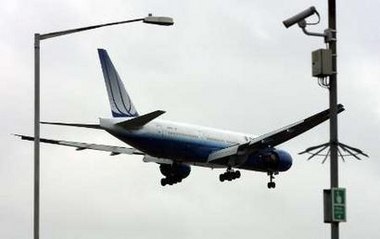BRUSSELS - European airlines and the European Union's justice and security
commissioner said on Wednesday they opposed any attempt to ban passengers from
carrying all forms of liquids on flights.

A United Airlines
aircraft flies into Heathrow airport in London August 14, 2006. Britain
scaled down its security alert overnight and eased a ban on airline cabin
baggage imposed last week after police said they had foiled a plot to blow
up airliners using liquid explosives disguised as drinks.
[Reuters] |
EU security experts were meeting on Wednesday and Thursday to make
recommendations after Britain said on August 10 it had foiled a plot to blow up
U.S.-bound transatlantic airliners. Officials said the plot involved homemade
liquid explosives.
Sources close to the meeting said liquids and gels may be banned from hand
luggage on flights.
"Prohibiting all liquids on board we see as unrealistic," said Francoise
Humbert, spokeswoman for the Association of European Airlines.
"People need to have something to travel overnight with them. You might need
to travel with medication, liquid medication, so this kind of thing should be
allowed," she said, adding small quantities should be permitted.
EU Justice and Security Commissioner Franco Frattini backed the airlines'
position.
"It's much better in my personal view to focus on detection of liquid
explosives rather than generically banning all liquid materials," Frattini told
Reuters in a phone interview.
"Our parallel preoccupation is to avoid taking disproportionate measures
affecting the daily lives of millions of European citizens. We have to strike
the right balance."
Any change to the rules on the transport of goods on flights would be decided
by the European Commission as a whole after the security experts made their
recommendations, said a Commission official.
Airport screening in mainland Europe is largely the same as it was before
August 10, except for U.S.- and British-bound flights on which liquids have been
forbidden.
But Britain's announcement of the transatlantic airliner bombing plot has
prompted discussion about the need for EU-wide security action.
The airline industry is keen to prevent expensive flight delays and says
security costs should be borne by EU countries.
"We're asking for member states to recognise that the threat was against them
and that passengers should not pay and that airlines and the air transport
industry should not pay," said Humbert.